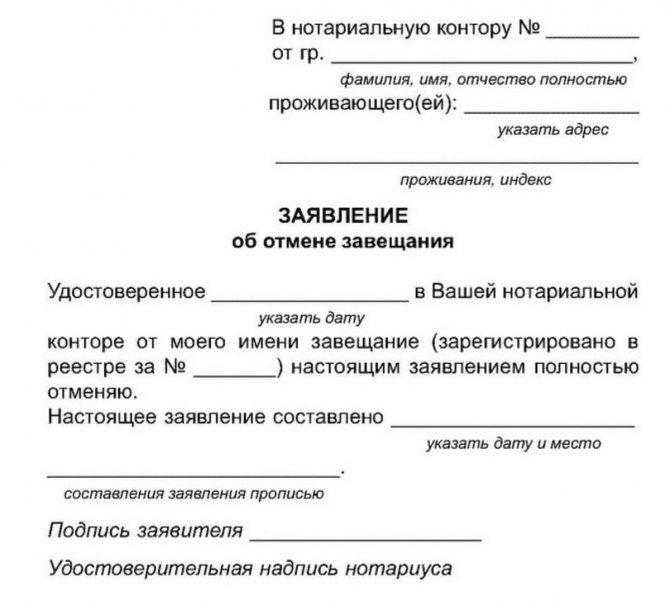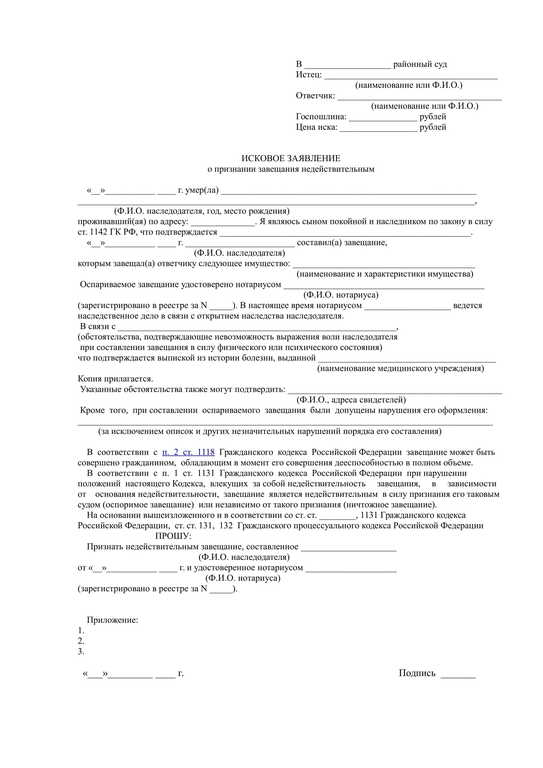Home » Inheritance » How to cancel a will for an apartment during your lifetime
9
A will is a reflection of the testator's last will. But due to unforeseen circumstances, it can be subject to changes throughout his life, giving rise to a discrepancy between what was written earlier and what is desired at the moment. If this does happen, the testator should not complain about his hasty choice. It is better to thoroughly review the stated orders and find out whether it would be legal to cancel them, as well as how to deal with a will that has only partially lost its relevance.
Is it possible to cancel a will on an apartment?
The possibility of canceling the act of expression of will follows from the provisions of Art. 1119 of the Civil Code of the Russian Federation, which reinforces the freedom of capable citizens to draw up, cancel and change property orders that will come into force after his death. At the same time, he will not be obliged to coordinate or even inform the persons indicated in the will about his decision. However, the powers of the testator also have some restrictions.
The testator cannot cancel or reduce the obligatory share of the inheritance due to his disabled parents, spouse and children, as well as dependents who have been in his support for at least a year (Article 1149 of the Civil Code).
These persons will receive the share of property required by law, reduced by half. But they can be deprived of it by the court in favor of the heir appointed in the will if he was using the object of inheritance at the time of the death of the legal owner. For example, the inheritance (apartment) left after the death of parents can become the full property of their daughter, who lived in it and had no other housing. While the testator’s own disabled sister, to whom he sent regular money transfers for three years, may lose the right to 1/4 of the apartment if she has her own living space.
How can you change your will?
A person who has decided to dispose of his property in the event of his death does not bind himself once and for all to the framework of this document. While the testator is alive, he can change or cancel the will, or make any adjustments to it. Moreover, he is not obliged to justify the changes and coordinate them with anyone. The ability of the testator to freely and unimpededly express his will in the form of a will is protected by law.
In this article we will look at the methods and procedure for changing wills, as well as the consequences that arise as a result of these changes. In addition, let us clarify the issue of the possibility of drawing up a will without the right to change it.
The legal basis, procedure and methods for changing wills are contained in Article 1130 of the Civil Code of the Russian Federation.
In addition, it should be borne in mind that from July 1, 2021, a new, third type of inheritance is being introduced in Russia - an inheritance contract. You can learn about the specifics of transferring property under an inheritance agreement from the contents of this article.
Reasons for revoking a will
The reasons for canceling or changing the act of expression of will can be different - their objectivity and significance are determined solely by the testator. Moreover, the testator has the right to keep secret from others the circumstances that prompted him to revoke his notarized orders.
A will is revoked by a notary on the basis of an application by its author to cancel individual orders, the document as a whole, or the drawing up of a new act that fully or partially contradicts the previous one.
Example . In the first will, the testator left his apartment to his daughter, but a few years after that she died. After this, her father came to the notary in order to revoke the document. To do this, he drew up a new will, in which he indicated his granddaughter instead of his deceased daughter.
Example . After drawing up the expression of will, the citizen changed his mind about one of the persons appointed by him and wished to exclude him from the list of successors. To do this, he submitted an application to the notary to cancel all orders concerning the unworthy, in his opinion, heir.
How does cancellation work?
The secrecy of a will allows the testator, at his own discretion, to change the terms of distribution of property or the composition of the heirs. The law allows you to cancel a will for an apartment at any time , but to do this you will need to comply with the requirements of the Civil Code of the Russian Federation for the form of cancellation. The following nuances of canceling or changing a testamentary form can be highlighted:
- the testator can completely cancel the will, or only a separate part of it (in case of partial cancellation, the remaining part of the will retains legal force and will be used for the distribution of property);
- the law allows you to cancel a will by drawing up a new document in which the same property will be distributed;
- Only he himself can cancel a will before the death of a citizen, since other persons do not have information about the existence of the document;
- from the moment the will is annulled, all property remaining after the death of the citizen will be inherited by law.
Having decided to revoke his will, a citizen must contact any notary office. When applying, you must indicate the cancellation of the document, or submit to the notary a new will for a similar composition of property. The notary is obliged to comply with all standard rules for verifying freedom of expression - to ensure the citizen’s legal capacity and the absence of coercion, threat or deception.
When canceling a testamentary form, the following rules are taken into account:
- the fact of complete or partial cancellation of a will is recorded in the form of a written document - an order for cancellation;
- the order is drawn up by the testator in his own hand and must be certified by a notary;
- information about the certification of the said order is entered into the federal notary register.
Download an application to revoke a will (sample)
Various nuances that may arise when canceling or changing a will are recorded in Article 1130 of the Civil Code of the Russian Federation.
To cancel a testamentary document, a citizen must submit the following set of forms and forms - a general passport; a true copy of the original will; completed cancellation order form. If an application is made for a new will, the previously drawn up document may not be presented.
When opening probate proceedings, the notary will check the existence of one or more wills, and priority will be given to the newer document. A subsequent testamentary form will completely or partially cancel the testator's previously issued instructions if they contradict the newer document.
After a will is completely annulled, a citizen has the right at any time to again contact a notary’s office to draw up a will. In this case, the composition of the heirs and the list of bequeathed assets may completely change. Each subsequent will can also be revoked by the free will of the testator.
Cancellation time and place
The testator has the right to cancel notarized orders at any time, up to his death, provided he has full legal capacity. In some cases, a certificate confirming this circumstance may even be required.
The place where a will is revoked is not regulated by law, nor is the place where it was drawn up. They may not even coincide - data on notarial actions in relation to all expressions of the citizen’s will are recorded in the Unified Information System, which eliminates the possibility of misunderstandings.
But the testator should also remember about the convenience of his successors, who will have to look for the will and redirect it to the notary working at the place of last registration of the deceased to open an inheritance case.
How to cancel and change a will for an apartment
The procedure for canceling posthumous orders is regulated by Art. 1130 Civil Code of the Russian Federation. It is carried out in the presence of a notary, necessarily in the presence of a passport identifying the testator - the authorized person is obliged to make sure that the amendments to the will are made by its maker. It is also recommended that the future testator have a medical certificate confirming his full legal capacity (especially important for citizens over 75 years of age).
Otherwise, the annulment of an act of unilateral will can be done in different ways and depends on the intentions of the applicant and the type of document he has drawn up.
Fully
If a citizen is fundamentally dissatisfied with his will and wants to completely review its contents, then he can do this in two ways:
- Writing an application to cancel a document.
- Drawing up a new act that contradicts the content of the previous one.
In the first case, the testator revokes the previous orders using a special statement drawn up in the form of a will, that is:
- Transferred to paper, taking into account the strict sequence of presentation of information, which should reflect not only the will of the citizen, but also his personal data, as well as the name and address of the notary.
- Certified by authorized persons - a notary or the head (director, captain, chief or duty doctor) of the institution, expedition where the testator resides and, due to the remoteness of his residence, cannot contact the notary.
- Signed by the will-maker and containing the date of completion.
In the second case, the potential testator simply draws up a new document with the instructions already changed. The old ones lose their power automatically.
It is worth keeping in mind that if the last will is declared invalid, the previous act of expression of will again acquires legal significance. An application for cancellation, executed with significant violations, also entails the preservation of the legal force of the will. But this rule does not apply to a document, the contents of which were canceled by a later canceled act (the citizen drew up one act, then another, contradicting the first, and after all this, canceled the second with a separate statement).
Example . The testator executed a deed with his posthumous dispositions and designated his illegitimate daughter as the sole heir. Then he changed his mind and bequeathed all the property to his nephew. And after that he revoked his last will. As a result, the first document remained legal, according to which his daughter would be his successor.
Example . The testator bequeathed the apartment to his two children in equal shares. After that, he ended up in a nursing home and, shortly before his death, made a new act of expression of will, in which the doctor on duty at the institution was appointed heir, who certified his last property dispositions. After the death of the testator, his children challenged the last act due to the inadmissibility of appointing a person executing the will as a successor. The first document eventually acquired legal force.
Separate orders
A citizen has the opportunity to leave the completed will valid, only partially adjusting its contents. This can also be done in two ways:
- Simple cancellation of individual orders - cancellation of the right of residence in the apartment of the appointed person in the manner of a testamentary refusal or cancellation of a testamentary assignment (while the right of inheritance for the specified successor is retained).
- By replacing individual clauses of the act with contradictory ones, when, for example, the same legacy is planned to be assigned to another recipient.
All adjustments are made by creating a separate document - making changes to an already drawn up act is prohibited.
In emergency situations
Orders left by a citizen in emergency circumstances can be written in a simple form (Article 1129 of the Civil Code of the Russian Federation). But their effect is not equivalent to those notarized and does not cancel them. In this way, you can only cancel or change a will made in a similar way.
But it is important to remember that any expression of will made under exceptional circumstances will be canceled a month after the situation is resolved, provided that the testator remains alive.
Procedure
If we summarize the procedures for canceling and changing the legal force of a will, we can identify the following algorithm of actions for the testator:
- A visit to a notary (preferably the one who certified the document being annulled).
- Writing an application for cancellation/change or certification of new orders.
- Payment of state duty.
Procedure
The testator has the right to contact any notary who exercises his powers on the basis of a valid license, but it is better if it is a specialist or an office that stores the first copy of the deed. This is explained by the need to perform additional actions if the testator decides to choose another authorized person to visit.
Despite the existence of the Unified Notary Information System, into which all data on completed or canceled notarial acts is entered, an application for cancellation or a new will submitted to another notary must be duplicated and sent by registered mail to the document being canceled.
You can find out the list of nearest notaries, their addresses and telephone numbers on the website of the Federal Notary Chamber using the “Find a Notary” electronic service. The first name, last name, and patronymic of the wanted specialist are entered into the search strings. You can also use the advanced search and select a notary based on territoriality and the availability of an accessible environment for citizens with disabilities.
An application for cancellation/change or a new will is essentially drawn up in the same way - to do this, the testator needs to verify his identity, certify the document with his personal signature in the presence of a notary and hand it over to an authorized person for certification. But at the same time, it is necessary to remember that the application and will are contestable and approach their execution with great responsibility.
The following actions will help strengthen the legal force of the act being performed:
- Providing the notary with a medical certificate confirming your full legal capacity.
- Calling witnesses* who will sign the application (will), further certifying the legality of what is happening.
- Compliance with the rules and forms of document preparation.
* - the following cannot be chosen as witnesses:
- notary;
- heirs, legatees, their relatives (parents, children, spouses);
- illiterate;
- those who do not speak the language of writing a will;
- incompetent;
- in an altered state of consciousness.
Revoking a Will Created in Emergency Circumstances
If the testator is in an emergency situation, his life is in danger, he can make a will in writing without having it certified by a notary. In this case, it is important to have two witnesses confirming that the last will was stated by a person without pressure from third parties and of sound mind. But if the author of the document remains alive, in the future, when he finds himself in favorable conditions, he must visit a notary’s office.

According to Art. 1129 of the Civil Code of the Russian Federation, a will created in emergency situations can only be canceled by the same document.
Joint wills of spouses, documents containing a decision on the establishment of an inheritance fund, are not drawn up in emergency circumstances.
Application for cancellation
The application for revocation, just like a will, does not have a strict form of presentation. There are certain nuances that are recommended to be taken into account when drawing up a declaration of will, and several rules regarding the execution of the document.
Form and content
First of all, you should note the design rules:
- Presentation is allowed on paper, by hand or using writing tools.
- The application must be signed by the testator, signed by him in the presence of a notary and, if desired, witnesses.
- An integral point in the content of the application is the date of filing, the full name of the notary who certified the revoked will, and the registration number of the act of expression of will.
Otherwise, the preparation of the application depends on the goals of the testator. If he plans to cancel individual orders, he needs to indicate this as specifically and unambiguously as possible so that the heirs do not subsequently have disputes and misunderstandings on this basis. It’s easier to cancel the entire will - all you need to do is write the number and place of the posthumous expression of will and declare it cancelled.
Sample application for cancellation of a will for an apartment 2021
The following statement can be considered as an example

Is it possible to cancel or change a will?
The cancellation or amendment of a testamentary document is regulated by civil law, namely:
- Art. 1130 of the Civil Code of the Russian Federation, according to which the testator can make changes to the document at any time without anyone’s consent. In this case, an addition to the will can completely cancel it or correct only some points.
- Art. 1129 of the Civil Code of the Russian Federation, regulating the process of drawing up a new will in emergency conditions.
- Art. 58 of the Civil Code of the Russian Federation indicates the obligation of a notary to enter information about the cancellation or correction of a document into the register.
- Art. 1128 of the Civil Code of the Russian Federation talks about the process of drawing up a testamentary disposition.
Failure to comply with legal requirements may result in the document being declared invalid. Thus, the right to adjust or cancel a previously created will is reserved for citizens in Art. 1130 Civil Code of the Russian Federation. This is allowed for the reason that a testamentary document is a unilateral act that does not require obtaining consent to change from third parties.
Dear readers! We cover standard methods for solving legal problems, but your case may be unique. We will help you find a solution to your problem for free
— simply call our legal consultant at:
This is interesting: Buying and selling an apartment by will 2021
It's fast and free ! You can also quickly get an answer through the consultant form on the website.
To cancel a will, you must contact a notary and draw up a new document. It will become the basis for the annulment of the first text. Moreover, there is no need to mention the abolition of the previous act in the new one - its very drafting implies this.
If you need to adjust only some points, you can draw up an administrative document and indicate the necessary changes in it. In this way, you can cancel part of a previously created will.
The first will can remain valid only if the new one is declared invalid in court. This can happen if the procedure for registering the will was violated or the testator’s signature was found to be unreliable. In other cases, the amended or canceled order cannot be restored.
Documentation
When making and revoking a will, the testator is required to submit a similar package of papers, which consists of only two documents - an identity card and a receipt for payment of state fees.
There is an opinion that the notary must present title documents for the apartment, a certificate of legal capacity, etc. But in fact, it is not entirely legal to demand them from the testator. This can be argued as follows:
- The law does not prohibit bequeathing property that did not belong to the testator at the time of certification of posthumous dispositions (the main thing is that the apartment should be registered by the day the inheritance is opened).
- The regulatory legal acts of the Russian Federation do not indicate that the testator is obliged to provide a certificate of sanity, and the notary has the right to demand it (Article 43 of the “Fundamentals of the Legislation of the Russian Federation on Notaries” states that the notary is obliged to check the legal capacity of persons who apply to him, but the method of this verification is not installs). However, you should not refuse to submit documentary evidence of your own legal capacity - this certificate will only strengthen the legal force of the application and strengthen the legal position of the testator.
Suitable identification documents:
- passport of a citizen of the Russian Federation or another state;
- passport of a military man, sailor;
- military ID;
- resident card;
- temporary residence permit, etc.
How to change a will
How to change a will is a question that often arises among testators who want to correctly distribute their property among their heirs.
A will is an important legal document, necessarily certified by a notary, in which the testator expresses his will as to how his property will be distributed after his death. Is it possible to change a will?
This is interesting: Mandatory share without a will 2021
Of course, the Civil Code of the Russian Federation provides for the possibility of changing it. A will is not something given once and for all. It can not only be changed, but even canceled altogether. But solely by the good will of the testator.
You can write or draw up, for example, a will for an apartment, and then cancel it and sell your home, or change it by adding or subtracting a certain number of heirs, redistributing shares among them, etc.
It is important to understand that this can only be done by the testator himself. Moreover, he must not notify anyone about the canceled or amended will, including the persons themselves who have inheritance rights. This is the exclusive will of the testator.
The reasons for making such a decision are usually very personal. Our state does not invade a person’s private life, therefore such an important document can be changed or canceled without any explanation.
However, according to the Civil Code, the testator does not have the right to endlessly change the disposition of his property drawn up by him and must do this exactly according to the established procedure.
Notarial practice has shown that the will most often subject to adjustment is for an apartment, house, or other types of housing, as for the most expensive property owned by our citizens.
How much does it cost to revoke a will?
The notary collects a fee from the testator for certifying orders in the amount established by Art. 333.24 of the Tax Code of the Russian Federation - 100 rubles for each action to cancel or change a notarized act.
In addition to the state fee, the testator will have to pay for legal and technical services provided by the notary. The tariff depends on the method of annulment of the will and on the region in which notarial actions are carried out. Below are the prices for Moscow:
- cancellation or change of will by submitting an appropriate order - 500 rubles;
- cancellation or modification by drawing up a new will, completely or partially contradicting the old one - 1900 rubles.
Procedure for revoking a will at a notary
A will cannot be revoked by crossing out or destroying it. cancel a will by contacting a notary to certify a new will or by submitting an application (order) to cancel a previous will.
Cancellation of a will occurs in two ways : direct cancellation and indirect.
- Direct cancellation - in this case, the testator draws up a new will and in it clearly indicates the cancellation of previous orders regarding his property or draws up a special document - an order to cancel the previously drawn up will.
- Indirect revocation - the testator makes a new will and it does not say anything about the fate of the previous one.
Making a new will
In this case, one should be guided by the norms of civil law, which state that a later will cancels a will previously drawn up , since in the last will there are no orders that would not be provided for in the new will.
In order to draw up a new will you must:
- You can make a will - you can do this yourself or use the services of a notary.
- Have the will certified by a notary. State size The fee for the certificate is 100 rubles. (Clause 13, Clause 1, Article 333.24 of the Tax Code of the Russian Federation).
any notary to draw up a new will , without being tied to your place of residence, the location of your property, or the place where the previous will was made.
New will form
All forms of a will have the same legal force ; a subsequent will cancels the previous ones, regardless of the form in which they were made.
exceptions to this rule . They concern:
- Wills made in emergency circumstances.
- Testamentary dispositions of rights to money stored in bank deposits.
A notarized will cannot be canceled by an emergency or bank will (Part 5 of Article 1130 of the Civil Code of the Russian Federation).
A testamentary disposition of rights to money drawn up in a bank can only be revoked by a testamentary disposition drawn up in the same bank. However, a new will in any other form can cancel a previously made testamentary disposition in a bank if it states that it also includes funds in bank accounts.
Order to revoke a will
When drawing up an order, the testator does not make a new will, but only terminates the existing one . The order must be drawn up in the same order and form as the will (Clause 4 of Article 1130 of the Civil Code of the Russian Federation). To certify the order, the testator can contact any notary, regardless of his place of residence, location of the property or place of certification of the revoked will.
The notary certifies the order according to the rules for certifying a will , namely:
- Checks the legal capacity of a person.
- Checks the compliance of the contents of the order with the actual will of the person.
- Draws up an order in two copies, one of which is given to the testator, and the second is kept by the notary.
However, it is better to submit an application to the notary office that certified the will being revoked, since this will eliminate the need to subsequently notify the notary who certified the previous will about its cancellation.
Consequences
The consequences of revocation of a will may be:
- A change in the inheritance order, as a result of which the heirs by law will be called upon to receive the apartment.
- Loss of the ability of some heirs under a will to claim living space or to receive a testamentary refusal at its expense.
- Transfer of ownership to a new designated successor.
- Exclusion from the will of sub-designated claimants.
Registration of donation
Some testators, in order to avoid the risk of the will being declared invalid and in order to speed up the process of transferring the apartment to the successor, opt for the execution of a deed of gift. Unlike a will, it cannot be canceled, it is much more difficult to challenge, and the moment of transfer of the object occurs almost immediately after the act of donation is completed.
For these reasons, the owners of property already bequeathed by a notarized deed apply for its cancellation and begin to draw up a deed of gift.
You cannot donate an apartment that has not been privatized or is planned for purchase. To conclude a transaction, the donor will need to confirm ownership of the object of donation using title documents and an extract from the Unified State Register of Real Estate.
The donation procedure is carried out as follows:
- Preparation of documents (donor's passport, adult passport or birth certificate of a minor recipient, deeds of title to the apartment, receipt of payment of state duty, extract from the house register, report of the estimated value of the living space, deed of gift in triplicate).
- Payment of the state fee for state registration (200 rubles).
- Visit to the Rosreestr office or multifunctional center.
- Concluding an agreement and registering the transfer of ownership of the apartment.
Close relatives (parents, spouse, children, brothers, sisters, grandparents) are exempt from paying tax on the gift received. The remaining recipients will have to pay the state 13% of the appraised value of the apartment.
Cancellation of a will, like its drafting, requires extreme precision in compliance with the rules established for this and clarity in the formulation of its orders. This will ensure the document has legal force and will deprive those who disagree with its contents of the opportunity to challenge the act in court. In order not to risk the well-being of his heirs and to ensure that the instructions made during his lifetime are implemented, the testator is recommended to seek the help of lawyers from the website ros-nasledstvo.ru. They will contact you within 5 minutes and answer the question asked through the form below for free.
FREE CONSULTATIONS are available for you! If you want to solve exactly your problem, then
:
- describe your situation to a lawyer in an online chat;
- write a question in the form below;
- call Moscow and Moscow region
- call St. Petersburg and region
Save or share the link on social networks
(
2 ratings, average: 3.00 out of 5)
- FREE for a lawyer!
Write your question, our lawyer will prepare an answer for FREE and call you back in 5 minutes.
By submitting data you agree to the Consent to PD processing, PD Processing Policy and User Agreement
Useful information on the topic
4
How to restore the missed deadline for accepting an inheritance
The law limits the period allotted for accepting an inheritance to 6 months from...
97
How to enter into an inheritance after death without a will according to law
A will is an act of unilateral expression of the will of the testator, allowing one to determine the future fate...
9
How to enter into an inheritance after the death of a husband
The rules and procedure for entering into inheritance are regulated by the third part of the Civil...
12
How to prove and confirm relationship with the deceased
The presence of family ties is the main condition for a calling to inheritance...
21
Inheritance of a privatized apartment after the death of the owner by law and will
After privatization, the apartment used on the basis of a social tenancy agreement passes...
91
How much does it cost to enter into an inheritance from a notary in 2021?
The amount of expenses for entering into an inheritance after death depends on...
How to revoke a will by an heir
Cancellation of the administrative document by the heir is carried out in court. The notary is not authorized to make such decisions. Interested parties need to prepare a package of documents and go to court.
Procedure for changing and canceling a will
Heirs must complete the following steps:
- Prepare evidence and statement.
- File a claim in court.
- Attend court proceedings.
- Get a court decision.
- Contact the notary office again.
Statement of claim
The form of the claim to declare an order invalid must comply with the requirements of the Code of Civil Procedure of the Russian Federation.
The application must indicate:
- name of the court;
- information about the plaintiff (full name, residential address);
- similar information about the defendant;
- information about the notary who has the inheritance file;
- reasons for challenging the order;
- evidence of the stated facts;
- requirements of the process initiator;
- list of attached documents.
If the statement of claim is filed by a representative of the plaintiff, an additional notarized power of attorney in his name will be required.
Sample statement of claim to contest a will

Required documents
The basis of any claim is evidence. Therefore, the relevant documents must be attached to the claim.
The evidence base includes:
- disputed administrative document;
- death certificate of the owner;
- evidence of relationship with the deceased subject;
- papers confirming claims;
- tax payment receipt.
The statement of claim is filed in accordance with the number of participants in the trial. Copies are certified by the signature of the initiator of the process or his representative.
Expenses
List of costs when challenging an order:
- State duty. When filing a claim, you must pay a state fee. The fee is 300 rubles.
- Legal advice. When contacting a specialized organization, you must pay a certain amount for a consultation. Costs can be avoided by submitting an application on our website. A hereditary specialist will provide information. Free of charge.
- Preparation of documents. Collecting evidence and inviting witnesses may become an additional cost item.
- Engaging a specialized lawyer. If there is a dispute between heirs, it is advisable to invite a specialist.
Important! If the plaintiff is entitled to benefits, then he is exempt from paying state fees when filing a claim. However, written evidence of this right must be attached to the application.








